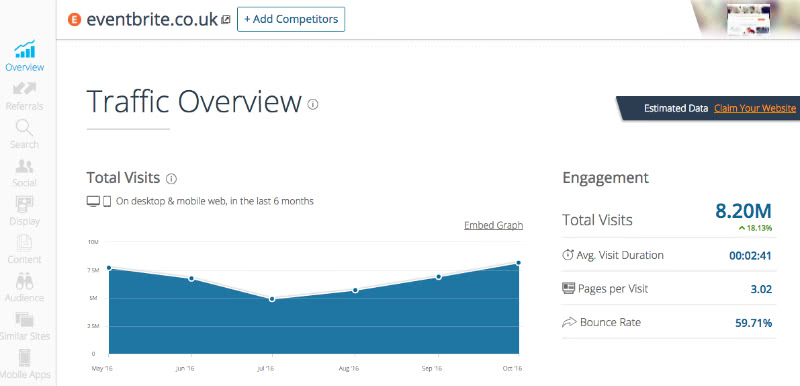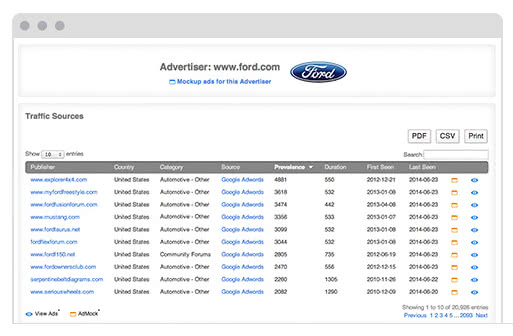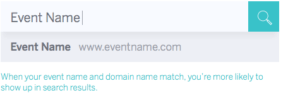Aussies love getting out to events — and with demand comes hot competition vying for your audience’s attention. So if you’re planning on how to market your event, you might like to know how your competitors are winning attendees and driving ticket sales online.
The good news is, there is a surprising amount of information that can be gathered online about rival events, using perfectly legal and sometimes free-to-try tools.
We’ve compiled a list of five competitive research tools to discover insights such as what keywords other events are using, your competitor’s ad budgets and how much traffic they’re clocking up. Once you have that valuable data you can put together an intelligence-backed marketing strategy that will help your event take a slice of the pie.
Competitive research tools for events #1: Keyword research
SpyFu
Simply enter your competitor’s URL into SpyFu and you can see every Google AdWords keyword they’ve ever bidded on (and how much they’ve spent). See how they started their AdWords campaign and how they optimised their copy and keyword groups over time to increase conversion rates – SpyFu has data going back 10-years.
You can also look at an individual keyword and see everybody that’s ever advertised on that keyword. If it’s a keyword all your competitors are going after then that’s a strong indication you should be too.
For more guidance, enter your own web address and receive SpyFu’s AdWord’s Advisor Report, giving you a list of top keywords you should be buying.

Competitive research tools for events #2: Backlink research
Moz Pro
Backlinks are still the cornerstone of getting good SEO results for your event’s website (in other words, being listed at the top of a Google search).
To help figure out how to get more backlinks to your website, Moz Pro offers a comprehensive package of SEO tools; one of these is Open Site Explorer.
Open Site Explorer lets you enter your own or a competitor’s URL to view inbound links. See how many there are, which domains they originate from, the anchor text being used for those links and the top pages for backlinks (the pages earning the most external links).
Another functionality is Link Opportunities, which provides three reports helping you to build backlinks. The first tells you about any broken links so you can get these fixed, the second gives you a list of unlinked mentions of your event so you can reach out and ask nicely if they will add one in for you.
The third report lets you enter two competitor URLs that you feel you should be listed alongside and shows you any website that links to both but not yours. This can identify potential targets for outreach.

Competitive research tools for events #3: Traffic research
SimilarWeb
Want to see how much traffic your competitor’s website is really attracting? SimilarWeb not only shows you how many visitors a site has, it also details average visit duration, average number of pages viewed per visit and bounce rate.
See what countries that traffic is coming from and the sources driving it. SimilarWeb allows you to dig deeper with further detail about each source, breaking down the referring sites, showing which social sites send the most traffic and where that URL is advertising. All this gives you an invaluable sneak peek at your rival’s marketing strategy.
You can also see other websites frequently visited by users of that site, and a list of websites it deems similar to the one you’ve searched enabling you to broaden your competitor analysis.

Competitive research tools for events #4: Ad research
WhatRunsWhere
If your competitor’s event is a sell-out success, you’ll want to know where they advertised. WhatRunsWhere can help you find out. This tool shows you exactly where your competitors are advertising online and what ads they’re using. It also gives insight into which ads are working for them, and which aren’t.
WhatRunsWhere provides access to campaign data from 150,000 display publishers, 90+ classified ad networks, and 15 different countries, enabling you to see the top performing campaigns – and effectively plan your own.
To ensure you don’t miss an opponent’s move, this tool allows you to track a list of competitors and receive an alert every time they launch a new ad or publish new content.

Competitive research tools for events #5: Social research
BuzzSumo
BuzzSumo lets you listen in on your competitors’ online conversations, monitor the content they share on social networks, and see which content is getting the most traction.
Simply enter their URL and see a list of their top shared content. The number of shares is broken down across Facebook, Twitter and LinkedIn so you can see which platforms they are having the most success on.
You can also view who is sharing their content and identify key influencers that you can, in turn, reach out to. Use the information to shape your content marketing plan, looking at the topics they’ve covered, the titles of their most popular pieces, the length of those pieces and what day they were published.
Compare how your content is performing in comparison or compare two competitors side by side. Make sure you never miss when they publish something new with competitor content alerts.

As the saying goes, “Knowledge is power.” Use these competitive intelligence tools to lift the lid on your competitors’ strategies and improve your chances of powering your way to a sold-out event!
Supercharge your event marketing
Discover more handy tools and integrations to supercharge your event marketing with Eventbrite.





